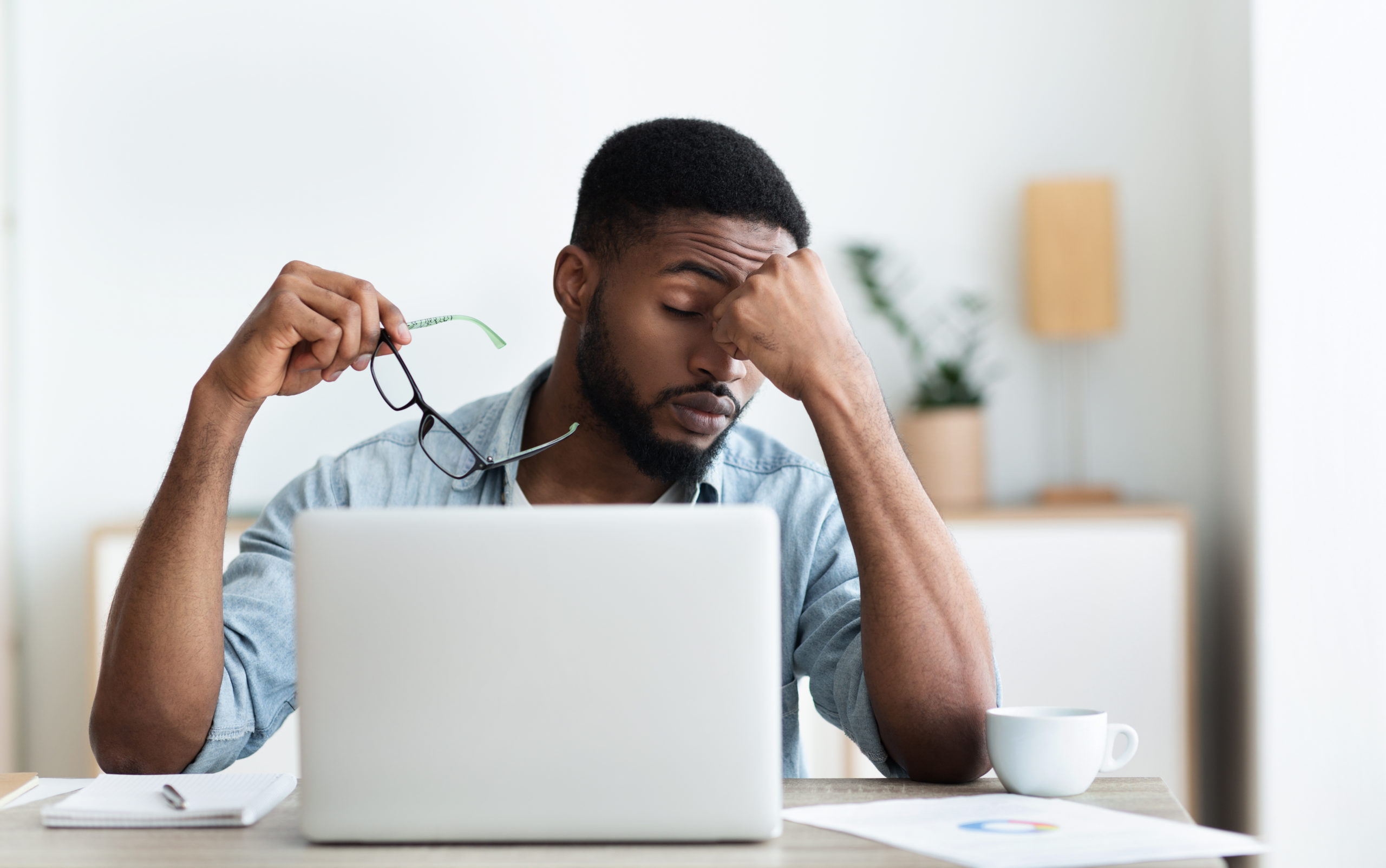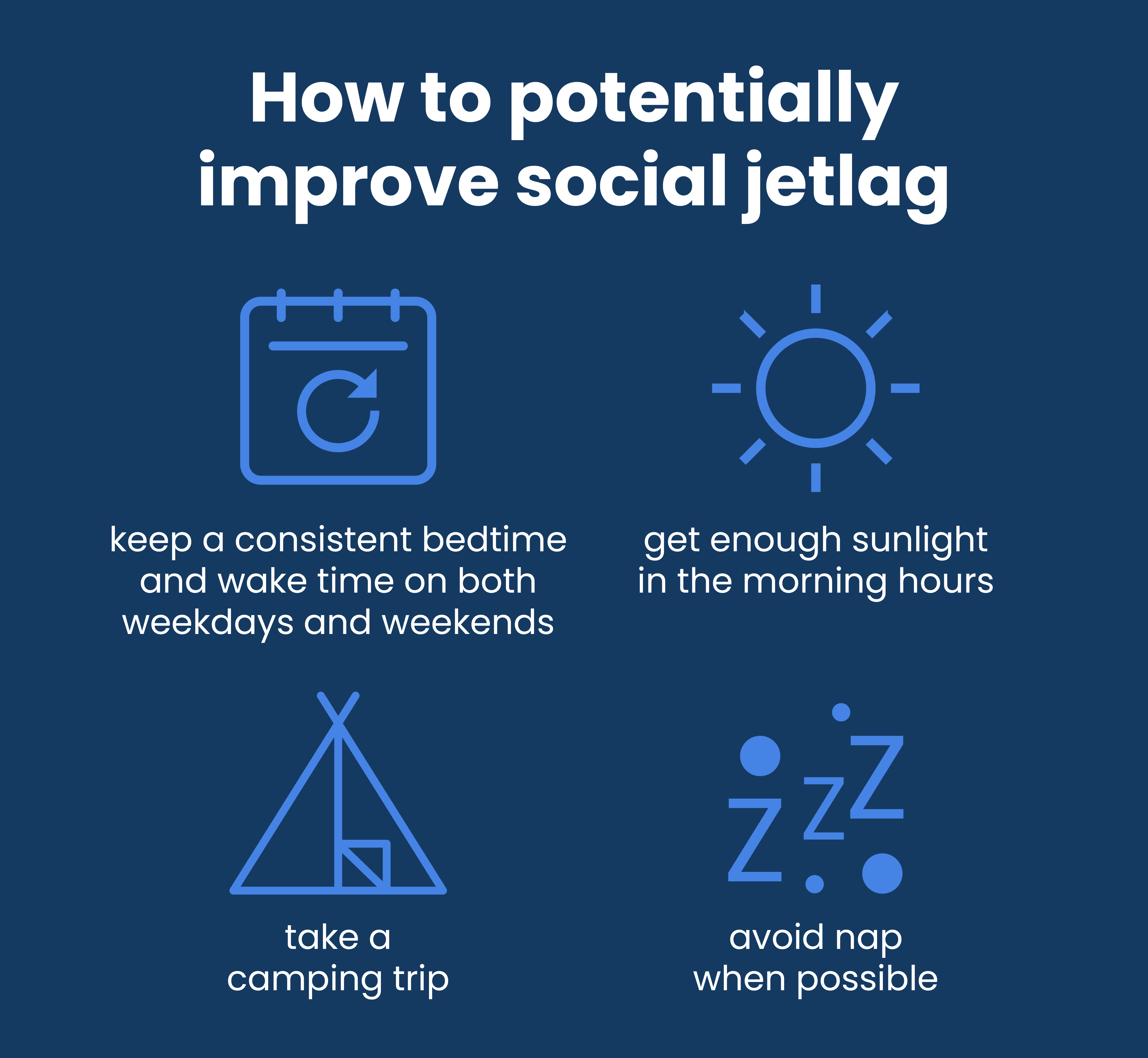Social Jetlag – The Not-So-New Phenomenon

What is Social Jetlag?
Many of us are probably familiar with the term jetlag – and many of us have, at some point, experienced its debilitating effects firsthand – but what happens when the effects of jetlag happen every week? This kind of jetlag is not caused by a transatlantic flight from London to Los Angeles, and symptoms don’t just wither away once you’ve acclimated to the change in time zones. Unlike travel-induced jetlag, this form of social jetlag occurs when you have drastically different sleep patterns on weekends compared to weekdays, often due to social obligations dictating your sleep–wake timing (Roenneberg et al., 2006)¹.
Take this scenario as an example:
After going to bed at 10PM and waking up at 6AM Monday through Friday for work, you finally decide to stay up well past midnight on Friday night and Saturday night for an evening with friends or family. As a result of the late night out, you sleep in each subsequent day until around 10AM – well past your original 6AM alarm. If you’re used to waking up during the week at 6AM, and on the weekends don’t wake until 10AM, you’ve essentially flown cross-country, passing multiple time zones.
Then, on Monday morning, you’re exhausted since you couldn’t get to bed on time to get your 8 hours of sleep because Friday and Saturday’s late nights and mornings messed with your internal clock (AKA, your circadian rhythm). It then takes a few days for your body to catch up to this “new” schedule, but by the time it does… it’s too late. Friday night comes along, and the vicious cycle continues.
This is social jetlag.
The Origin of the Term
Social jetlag was first coined by German chronobiologist Till Roenneberg in 2006 to describe the discrepancy between biological and social time caused by different sleep schedules on weekdays and weekends (Roenneberg et al., 2006)¹. According to Professor Roennenberg, “The behavior looks like if most people on a Friday evening fly from Paris to New York or Los Angeles to Tokyo and on Monday they fly back. Since this looks like almost a travel jetlag situation, we called it social jetlag.”
Why is Social Jetlag So Common?
Social jetlag is also more common than you may think. Chances are you’re one of the nearly 70% of adults exhibiting signs of social jetlag. And you may have even noticed the term making headlines recently. That 70& experiences at least 1 hour of social jetlag weekly, with 30–50% experiencing ≥ 2 hours. Evening-type individuals (“night owls”) are especially at risk, as their natural biological timings conflict with standard work routines (Roenneberg et al., 2006)
The Pandemic Effect
During COVID‑19 lockdowns, social jetlag decreased by ~30 minutes globally, and sleep duration increased by about 30 minutes on weekdays—thanks to relaxed schedules (Bouman et al., 2023; Korman et al., 2020)⁸. However, many individuals shifted to later chronotypes—going to bed and waking later—which created problems when they returned to standard schedules⁸.
While this may not sound like a big deal, what happens if (or, when) it’s time to return to a pre-pandemic schedule and both wake up and go to bed earlier than usual? Social jetlag.
Health Consequences of Social Jetlag
1. Short-Term Symptoms
Disrupted routines can mimic travel jetlag: daytime fatigue, irritability, poor concentration, digestive discomfort, and general lethargy (AASM, 2016)
2. Cardiovascular Risk
Each additional hour of social jetlag is linked to an 11% increased risk of heart disease, regardless of sleep quantity or insomnia (AASM, 2016)⁰. Inconsistent schedules are also associated with elevated triglycerides, reduced HDL, and glucose intolerance (Nature review, 2023)⁸.
3. Metabolic and Obesity-related Effects
Social jetlag correlates with a higher BMI, larger waist circumference, elevated inflammation, and double the risk of type 2 diabetes—especially with >=2 hours misalignment (Parsons et al., 2015)
4. Mental Health
Adults with >2 hours social jetlag have around double the likelihood of depressive symptoms and reduced well-being; young adults are particularly vulnerable (Parsons et al., 2015).
5. Cognitive and Performance Deficits
Irregular sleep timing is linked to slower reaction times, impaired workplace or academic performance, and reduced heart rate variability (AASM, 2016); (Hartstein et al., 2025).
These findings highlight that safeguarding not only sleep duration, but also consistency, is critical for long-term health.
How to Bounce Back
To help kickstart your sleep health journey and reduce the impacts of social jetlag we’ve compiled a list of tips that may work for your specific needs and internal clock!
 Keep Your Sleep Schedule Within 30–50 Minutes – Health risks escalate when weekend-weekday sleep offset exceeds 1 hour—keeping it within 30–50 minutes minimizes metabolic and mental health impacts (Nature Review, 2020).
Keep Your Sleep Schedule Within 30–50 Minutes – Health risks escalate when weekend-weekday sleep offset exceeds 1 hour—keeping it within 30–50 minutes minimizes metabolic and mental health impacts (Nature Review, 2020). - Maximize Morning Sunlight & Limit Evening Brightness – Morning natural light resets circadian rhythms, while reducing blue light exposure in the evening supports melatonin onset (Nature review, 2023).
- Weekend Camping Reset – Just one weekend in nature, without artificial light, shifts melatonin production by 1.4–1.8 hours earlier—resetting the circadian phase (Stothard et al., 2017; Colorado Boulder, 2017)¹⁻⁵. Extended outdoor exposure can shift it by 2.5+ hours⁰⁻¹¹.
- Nap Smartly – Daytime napping should be limited to 10–20 minutes to boost alertness without disrupting night sleep (AASM, 2016).
Practical “Social Jetlag” Survival Tips
- Maintain a consistent sleep and wake time, with ≤ 50 minutes variation on weekends.
- Expose yourself to sunlight in the morning—open curtains or take a walk.
- Dim or filter blue light from screens in the evening.
- Consider a camping weekend or simulate it indoors with bright daytime light and dark evenings.
- If napping, limit it to 10–20 minutes, early in the day.
- Engage in calming pre-bed rituals—stretching, reading, light snacks, and avoiding caffeine/alcohol later in the day.
- Use a gentle wake-up strategy, like a sunrise alarm or vibration option.
The Bottom Line
Social jetlag is more than a weekly fatigue cycle—it has systemic implications. A consistent schedule—even within 30 minutes—along with morning light, controlled naps, and occasional natural resets (like camping), can meaningfully realign your internal clock. Small shifts in routine equal measurable gains in health and wellbeing.
How SleepScore Can Help
At SleepScore Labs, we’re committed to helping you better understand and improve your sleep—especially when it comes to minimizing social jetlag. Our SleepScore App provides detailed, science-backed sleep tracking and personalized insights that show how your sleep patterns shift throughout the week. You’ll receive tailored recommendations to improve sleep consistency, boost quality, and reset your body clock.
Whether you’re aiming for more energy during the week or smoother transitions between weekday and weekend, SleepScore is here to guide your journey toward better, healthier sleep – download our free app today on both the App Store and Google Play.
Sleep well!
Sources
- Wittmann, M., Dinich, J., Merrow, M., & Roenneberg, T. (2006). “Social jetlag: Misalignment of biological and social time.” Chronobiology International. https://doi.org/10.1080/07420520500545979
- Bouman, E. J., et al. (2023). “Social jet lag and (changes in) glycemic and metabolic control in people with type 2 diabetes.” Obesity. https://pubmed.ncbi.nlm.nih.gov/
- Korman, M., et al. (2020). “COVID‑19‑mandated social restrictions unveil the impact of social time pressure on sleep and body clock.” Scientific Reports. https://www.nature.com/articles/s41598-020-79299-7
- Parsons, M. J., et al. (2015). “Social jetlag, obesity and metabolic disorder: investigation in a cohort study.” International Journal of Obesity. https://www.nature.com/articles/ijo2014147
- Stothard, E. R., et al. (2017). “Circadian entrainment to the natural light–dark cycle across seasons.” Current Biology. https://doi.org/10.1016/j.cub.2017.04.046
- Colorado Boulder Today. (2017). “Can’t get to sleep? A wilderness weekend can help.” CU Boulder Today. https://www.colorado.edu/today/2017/02/01/cant-get-sleep-wilderness-weekend-can-help
- Forbush, S. B., et al. (2017). “Social jet lag is associated with worse mood, poorer health and heart disease.” American Academy of Sleep Medicine. https://aasm.org/social-jet-lag-is-associated-with-worse-mood-poorer-health-and-heart-disease/
- Vallejo-Vaz, A. J., et al. (2022). “Triglycerides revisited: is hypertriglyceridaemia a necessary therapeutic target?” European Heart Journal – Cardiovascular Pharmacotherapy, 9(6), 570–582. https://academic.oup.com/ehjcvp/article/9/6/570/7199773academic.oup.com
- Zuraikat, F. M., Makarem, N., Redline, S., Aggarwal, B., Jelic, S., & St-Onge, M.-P. (2020). “Sleep Regularity and Cardiometabolic Health: Is Variability in Sleep Patterns a Risk Factor for Excess Adiposity and Glycemic Dysregulation?” Current Diabetes Reports, 20(38). https://doi.org/10.1007/s11892-020-01324-w
- Hartstein, L. E., Grandner, M. A., & Behn, C. D. (2025). “Sleep Irregularity and Circadian Rhythmicity: Implications for Health and Well-Being.” Current Sleep Medicine Reports, 11(5). https://doi.org/10.1007/s40675-025-00318-y
- Parsons, M. J., et al. (2015). “Social jetlag, obesity and metabolic disorder: investigation in a cohort study.” International Journal of Obesity, 39(5), 842–848. https://doi.org/10.1038/ijo.2014.201